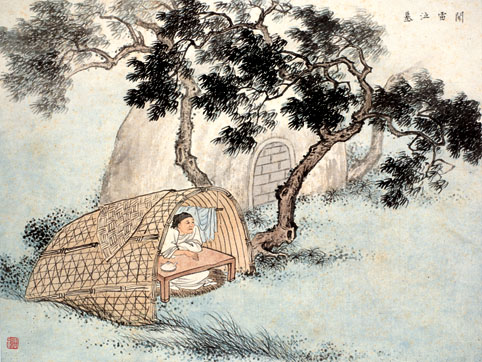王裒闻雷泣墓(中英)

中国二十四孝经典民间故事
16:Crying By the Grave When Thunder Rolled: Wang Pu 闻雷泣墓:王裒
Wang Pu (Wang Weiyuan) was a filial son who lived during the Three Kingdoms Period. His mother dreaded the sound of thunder-claps. Every time the sky filled with dark clouds and rain was on the way, Wang Pu would run to his mother's side to comfort her and to calm her fears. If her son was not at her side, the old woman felt unbearable alarm.
王裒,魏晋时期营陵(今山东昌乐东南)人,他的母亲害怕打雷。每当天空有了乌云,即将下雨时,王裒立刻跑回家安慰母亲,陪伴他。当儿子不在身边时,母亲就会发疯一样的乱叫。
After his mother passed on, Wang Pu buried her in a neighboring graveyard.
母亲死后,王裒葬她语邻居的院子里。
Even though the old lady was no longer alive, every time a storm approached, and it appeared that lightning was coming, he would run to the graveside and kneel by his mother's tombstone with tears running down his cheeks.
尽管母亲不在了,每当雷闪交加时,他就会跑到母亲的坟前,跪下哭泣。
"Don't cry Mother, your son is nearby!", he would call, just as if his mother was alive. As long as the storm lasted, the man remained near the grave, circling around it countless times, to protect his mother's spirits and keep her from fear.
每当风雨天气,听到雷声,他就跑到母亲坟前,跪拜安慰母亲说:“裒儿在这里,母亲不要害怕。”雷雨持续多久,他也在墓前待多久,在墓前一圈一圈的转着,保护着母亲。
Later when he taught school, every time he read a passage that mentioned the emotion felt by devoted sons and daughters for their departed parents, Wang Pu's own feelings would overflow, and he would cry with deep longing.
他教书时,每当读到《蓼莪》篇,就常常泪流满面,思念父母。
Seeing this behavior, his students would carefully remove any texts that talked about the tender feelings of children for their parents.
学生见于此,每当读到这些时,都会很小心的转移话题,谈到孩子对父母。
Wang Pu always emphasized in his lessons the necessity of repaying the kindness of one's parents while they are still alive. He was considered a model of filial behavior, and his constant regard for his departed mother moved the hearts of all those who witnessed it.
父亲王仪被司马昭杀害,他隐居以教书为业,终身不面向西坐,表示永不作晋臣。其母在世时怕雷,死后埋葬在山林中。

中国二十四孝经典民间故事
16:Crying By the Grave When Thunder Rolled: Wang Pu 闻雷泣墓:王裒
王裒,魏晋时期营陵(今山东昌乐东南)人,他的母亲害怕打雷。每当天空有了乌云,即将下雨时,王裒立刻跑回家安慰母亲,陪伴他。当儿子不在身边时,母亲就会发疯一样的乱叫。
母亲死后,王裒葬她语邻居的院子里。
尽管母亲不在了,每当雷闪交加时,他就会跑到母亲的坟前,跪下哭泣。
每当风雨天气,听到雷声,他就跑到母亲坟前,跪拜安慰母亲说:“裒儿在这里,母亲不要害怕。”雷雨持续多久,他也在墓前待多久,在墓前一圈一圈的转着,保护着母亲。
他教书时,每当读到《蓼莪》篇,就常常泪流满面,思念父母。
学生见于此,每当读到这些时,都会很小心的转移话题,谈到孩子对父母。
父亲王仪被司马昭杀害,他隐居以教书为业,终身不面向西坐,表示永不作晋臣。其母在世时怕雷,死后埋葬在山林中。
Wang Pu (Wang Weiyuan) was a filial son who lived during the Three Kingdoms Period. His mother dreaded the sound of thunder-claps. Every time the sky filled with dark clouds and rain was on the way, Wang Pu would run to his mother's side to comfort her and to calm her fears. If her son was not at her side, the old woman felt unbearable alarm.
After his mother passed on, Wang Pu buried her in a neighboring graveyard.
Even though the old lady was no longer alive, every time a storm approached, and it appeared that lightning was coming, he would run to the graveside and kneel by his mother's tombstone with tears running down his cheeks.
"Don't cry Mother, your son is nearby!", he would call, just as if his mother was alive. As long as the storm lasted, the man remained near the grave, circling around it countless times, to protect his mother's spirits and keep her from fear.
Later when he taught school, every time he read a passage that mentioned the emotion felt by devoted sons and daughters for their departed parents, Wang Pu's own feelings would overflow, and he would cry with deep longing.
Seeing this behavior, his students would carefully remove any texts that talked about the tender feelings of children for their parents.
Wang Pu always emphasized in his lessons the necessity of repaying the kindness of one's parents while they are still alive. He was considered a model of filial behavior, and his constant regard for his departed mother moved the hearts of all those who witnessed it.
 六年级下册英语书
六年级下册英语书 三年级下册英语书
三年级下册英语书 六年级上册英语书
六年级上册英语书 五年级下册英语书
五年级下册英语书 五年级上册英语书
五年级上册英语书 四年级下册英语书
四年级下册英语书